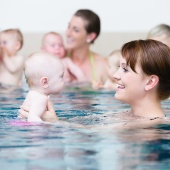Parents often have lots of questions about sex after having a baby. How long should you wait until having sex? Is it normal not to feel like it? We look at the facts below.
When is it safe to start having sex again?
Once the mother or birthing person’s bleeding has stopped, they can have sex again when it feels right for everyone. Time should be allowed for a perineal tear, or perineal or caesarean stitches to heal before having sex (RCOG, 2015).
But it's perfectly normal not to want to have sex in the early days and no one should feel they have to before they’re ready. There are many other ways to be close and affectionate (NHS, 2024).
Why don’t I feel like having sex yet?
Parents might not want to have sex in the early days after their baby is born for lots of reasons.
Having had a third or fourth-degree tear, giving birth with the help of forceps or a ventouse, or having a caesarean birth can make women or birthing people more anxious about having sex again (McDonald et al, 2023; RCOG, 2015).
In which case it’s important to:
- wait until stitches have healed
- talk to a partner about worries
- wait until you’re ready to have sex
Other factors which might delay parents wanting to have sex include (Jawed-Wessel et al, 2017; McDonald et al, 2023; Rezaei et al, 2024; Serrano et al, 2020; Yee et al, 2013):
- Extreme tiredness
- Having other children or babies in the house
- Stress and worry about parenthood
- Changes in body image
- Taking on new roles as parents
- Breastfeeding
Fathers and co-parents
Fathers, co-parents or partners might be anxious about hurting the woman or person who has given birth (NHS, 2024).
Research has shown that fathers who spend time with their children have lower testosterone levels after their baby is born. This decline is thought to be a biological response in the brain to make them put in more effort as a father and caregiver. Some new fathers might therefore feel less interested in sex than before they had their baby (Corpuz et al, 2021).
When do most people start to have sex after having a baby?
There is a wide variety in the timing of when women or birthing parents have vaginal sex. A study in 2013 found that:
- By 8 weeks, more than half of heterosexual couples had started to have sex again
- By 12 weeks, this had increased to three quarters (McDonald et al, 2013).
There is a lack of studies on the experiences of lone parents and same sex couples.
Sexual activity vs vaginal sex
Parents were more likely to start other sexual activity earlier than penetrative vaginal sex (McDonald, 2013).
By six weeks after having a baby (McDonald, 2013):
- 53 in 100 women had resumed sexual activity
- 41 in 100 women had attempted vaginal sex
After this, women who had attempted vaginal sex had increased to (McDonald, 2013):
- 65 in 100 by eight weeks
- 78 in 100 women by 12 weeks
- 94 in 100 women by six months
Most couples start having sex again by 12 weeks. However, they may not have sex as often as they did during pregnancy or before pregnancy (Jawed-Wessel et al, 2017).
Is it bad for our relationship if we don’t have sex?
Many people worry about how having sex less, or no sex, in the early days after a baby will affect their relationship (Schlagintweit et al, 2016). Talking to your partner about any anxieties around having sex can put your mind at rest (RCOG, 2015).
Not having sex as often as before having a baby does not necessarily mean that the couple’s relationship will suffer (Lorenz et al, 2019).
A study found that less sexual activity early on can help parents pay more attention to the baby. This is useful from an evolutionary perspective. It also found that couples having less sex might have a better quality relationship in other areas, for example in support, intimacy and responsiveness (Lorenz et al, 2019).
So, less sex doesn’t mean your relationship is failing, if you continue to support and respond to each other in other ways.
Other ways to maintain closeness
There are lots of other ways to maintain intimacy before having sex, including:
- Kissing
- Cuddling
- Massage
- Mutual masturbation
Talk to each other about what you’d like to do or not do.
How can I have sex comfortably?
When you decide to try having sex again, it might help to build up to it slowly, by starting with stroking or foreplay.
You can begin with other sexual activities, such as mutual masturbation, until you feel ready to have penetrative sex.
After birth, hormonal changes can make the vagina drier. A water-soluble lubricant can be useful when having sex or using sex toys (RCOG, 2015; Rezaei et al, 2024).
Perineal massage might help the mother or birthing person to feel more comfortable before having sex. This can be done alone or with a partner (RCOG, 2015).
Sex may feel strange or slightly uncomfortable at first. Tell your partner about any discomfort you’re feeling, as being at ease is key. Things should improve, but tell a healthcare professional if it carries on being uncomfortable (RCOG, 2014).
Breastfeeding and sex
If the mother or parent is breastfeeding, their nipples and breasts can be more sensitive.
Some may find this pleasurable, but others might no longer enjoy their breasts or nipples being touched sexually (Yurtsal et al, 2023). They might already feel ‘touched out’ by the baby and don’t want their breasts touched further. Or they may simply find it no longer sexually stimulating (Yurtsal et al, 2023).
Breastfeeding releases oxytocin, ‘the love hormone.’ This can make breastfeeding mothers and parents feel relaxed and content after feeding (Yurtsal et al, 2023). Oxytocin may also cause milk to leak out of the breasts during sex (Yurtsal et al, 2023).
Vaginal dryness can be more common in breastfeeding mothers and parents, as their oestrogen levels are lower. Using a lubricant can help (Yurtsal et al, 2023).
Contraception
Periods are unlikely to return if exclusively breastfeeding (NHS, 2024).
However, even when breastfeeding, it’s possible to get pregnant three weeks after the birth of a baby (NHS, 2024). To avoid another pregnancy, contraception always needs to be used during sex (NHS, 2024). A midwife or GP can explain which types of contraception are suitable.
Corpuz, R., D'Alessandro, S., & Collom, G. K. S. (2021). The postnatal testosterone rebound in first-time fathers and the quality and quantity of paternal care. Developmental psychobiology, 63(5), 1415–1427. https://doi.org/10.1002/dev.22064 [Accessed August 2025]
Jawed-Wessel S, Sevick E. (2017) The impact of pregnancy and childbirth on sexual behaviors: A systematic review. The Journal of Sex Research. 54(4-5):411-423. http://www.tandfonline.com/doi/abs/10.1080/00224499.2016.1274715 [Accessed August 2025]
Lorenz T, Ramsdell EL, Brock RL. (2019) A close and supportive interparental bond during pregnancy predicts greater decline in sexual activity from pregnancy to postpartum: applying an evolutionary perspective. Front Psychol. 10:2974. https://www.ncbi.nlm.nih.gov/pmc/articles/PMC6966960/ [Accessed August 2025]
McDonald E, Brown S. (2013) Does method of birth make a difference to when women resume sex after childbirth?. BJOG.120(7): 823–830. https://obgyn.onlinelibrary.wiley.com/doi/full/10.1111/1471-0528.12166 [Accessed August 2025]
NHS (2024) Sex and contraception after birth. https://www.nhs.uk/baby/support-and-services/sex-and-contraception-after-birth/ [Accessed August 2025]
RCOG. (2015) A third- or fourth-degree tear during birth (also known as obstetric anal sphincter injury- OASI. Available from: https://www.rcog.org.uk/globalassets/documents/patients/patient-information-leaflets/pregnancy/pi-third--or-fourth-degree-tear-during-birth.pdf [Accessed August 2025]
Rezaei, N., Behboodi Moghadam, Z., Tahmasebi, A., Taheri, S., & Namazi, M. (2024). Women`s sexual function during the postpartum period: A systematic review on measurement tools. Medicine, 103(30), e38975. https://doi.org/10.1097/MD.0000000000038975 [Accessed August 2025]
Schlagintweit HE, Bailey K, Rosen NO (2016) A new baby in the bedroom: frequency and severity of postpartum sexual concerns and their associations with relationship satisfaction in new parent couples. The Journal of Sexual Medicine. 13(10):1455-1465. DOI: 10.1016/j.jsxm.2016.08.006. PMID: 27592145. [Accessed August 2025]
Serrano Drozdowskyj, E., Gimeno Castro, E., Trigo López, E., Bárcenas Taland, I., & Chiclana Actis, C. (2020). Factors Influencing Couples' Sexuality in the Puerperium: A Systematic Review. Sexual medicine reviews, 8(1), 38–47. https://doi.org/10.1016/j.sxmr.2019.07.002 [Accessed August 2025]
Yee, L. M., Kaimal, A. J., Nakagawa, S., Houston, K., & Kuppermann, M. (2013). Predictors of postpartum sexual activity and function in a diverse population of women. Journal of midwifery & women's health, 58(6), 654-661. https://onlinelibrary.wiley.com/doi/10.1111/jmwh.12068 [Accessed August 2025]
Yurtsal, Z.B., Uslu, D. (2023). Sexual Aspects of Breastfeeding and Lactation. In: Geuens, S., Polona Mivšek, A., Gianotten, W. (eds) Midwifery and Sexuality. Springer, Cham. https://doi.org/10.1007/978-3-031-18432-1_9 [Accessed August 2025]








